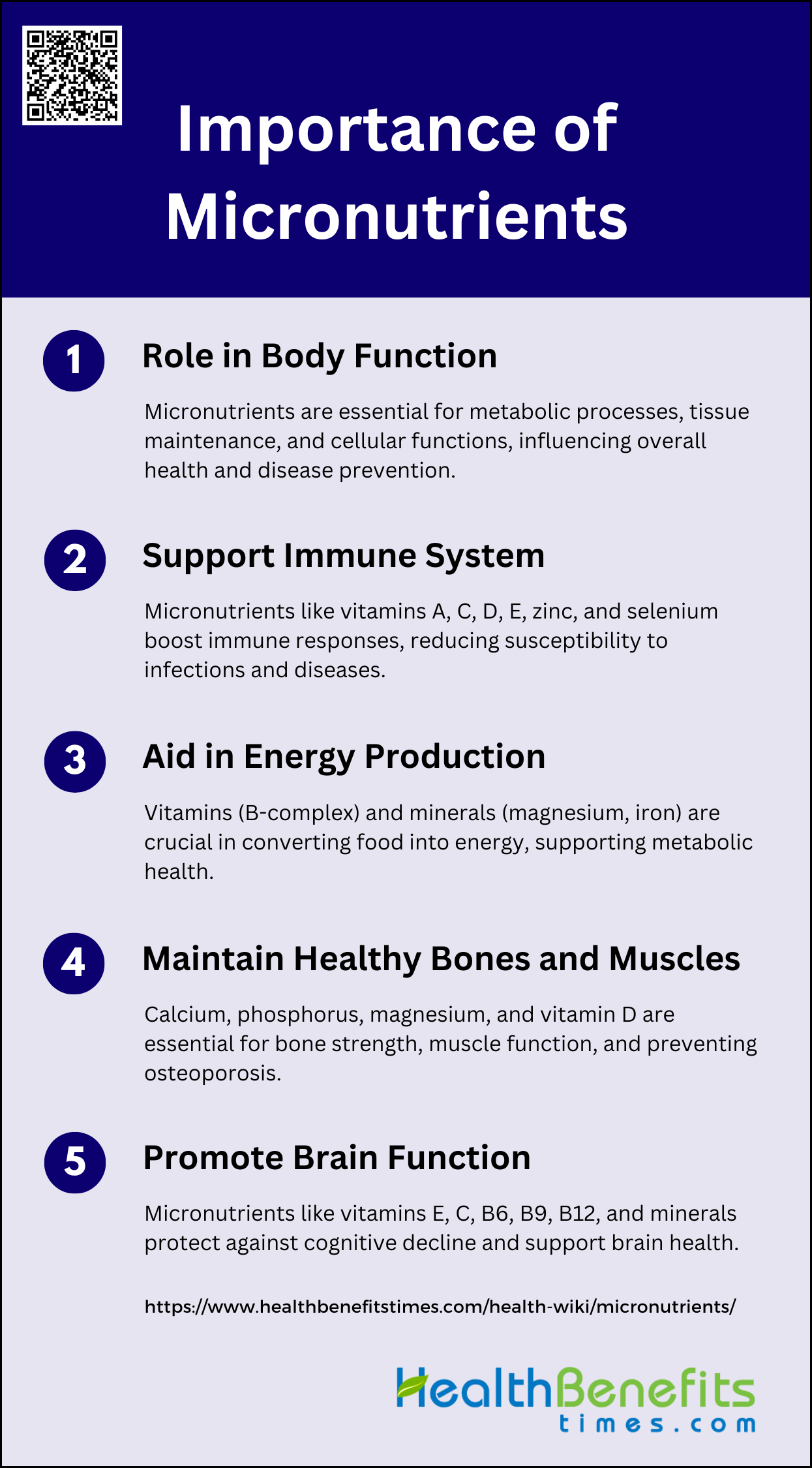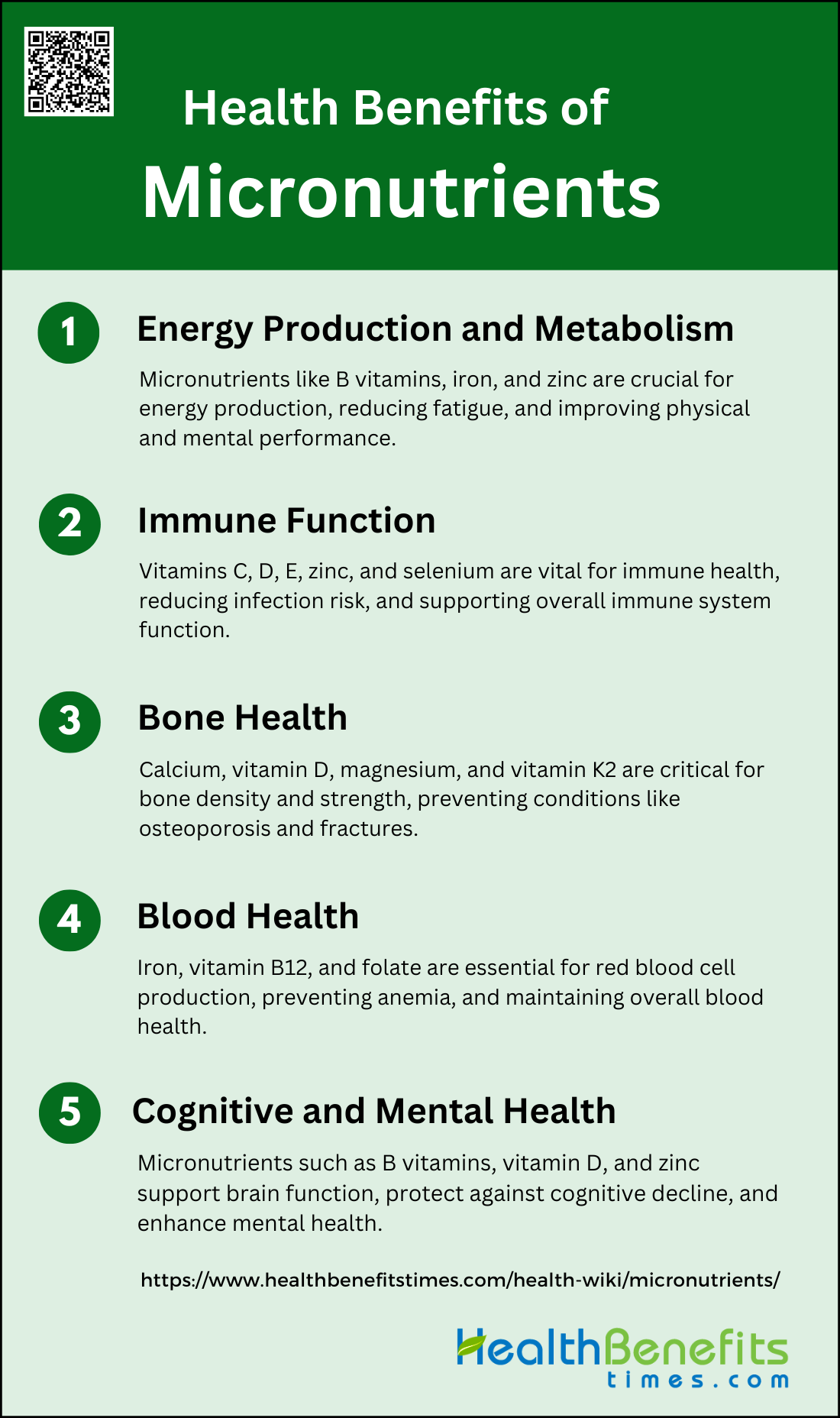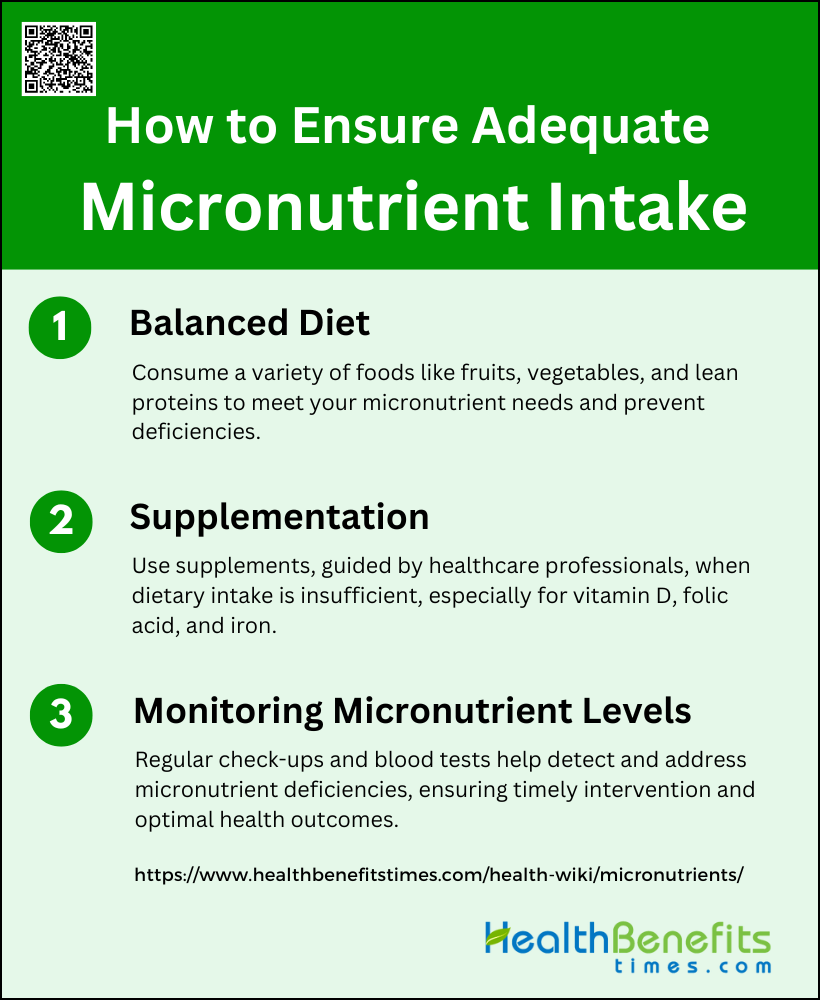Micronutrients are essential nutrients required by the body in small amounts for proper functioning and overall health. Unlike macronutrients, which provide energy, micronutrients primarily include vitamins and minerals that play crucial roles in various physiological processes. These nutrients are vital for maintaining immune function, energy production, bone health, and the prevention of diseases. Common micronutrients include vitamins such as A, C, D, E, and B-complex, as well as minerals like iron, zinc, calcium, and magnesium. Despite their necessity in small quantities, deficiencies in micronutrients can lead to significant health issues, including weakened immune response, impaired cognitive function, and increased susceptibility to chronic diseases. Ensuring an adequate intake of micronutrients through a balanced diet is essential for maintaining optimal health and preventing nutrient-related deficiencies.
How micronutrients differ from macronutrients
Micronutrients and macronutrients are both essential for maintaining health, but they differ significantly in their roles and required quantities. Macronutrients, which include carbohydrates, proteins, and fats, are needed in large amounts as they provide the energy necessary for bodily functions and support growth and development. In contrast, micronutrients, such as vitamins and minerals, are required in much smaller quantities but are crucial for various physiological functions, including enzyme function, hormone production, and immune system support. While macronutrients are measured in grams, micronutrients are typically needed in milligrams or micrograms per day. Both types of nutrients must be balanced in the diet to ensure overall health and prevent deficiencies or chronic diseases.
Types of Micronutrients
Micronutrients are essential nutrients required by the body in small amounts for proper functioning and overall health. They play crucial roles in various physiological processes, including growth, disease prevention, and well-being. The two main types of micronutrients are vitamins and minerals, each serving unique and vital functions in the body.
1. Vitamins
Vitamins are essential organic compounds that the human body needs in small quantities for various physiological functions. They are categorized into two main types: water-soluble and fat-soluble vitamins. Water-soluble vitamins include the eight B vitamins and vitamin C. These vitamins are not stored in the body and need to be consumed regularly through the diet. They play crucial roles in energy production, immune function, and blood coagulation. On the other hand, fat-soluble vitamins include vitamins A, D, E, and K. These vitamins can be stored in the body’s fatty tissues and liver, and they are essential for vision, bone health, antioxidant activity, and blood clotting. However, excessive intake of fat-soluble vitamins can lead to hypervitaminosis, a condition characterized by toxic levels of vitamins in the body.
2. Minerals
Minerals are inorganic elements that are vital for the body’s structural and functional processes. They are divided into major minerals and trace minerals based on the required amounts. Major minerals, also known as macrominerals, include calcium, phosphorus, potassium, sodium, and magnesium. These minerals are needed in larger quantities and are crucial for bone health, fluid balance, and muscle function. Trace minerals, or microelements, are required in smaller amounts and include iron, zinc, iodine, selenium, and copper. These trace minerals play significant roles in enzyme function, hormone production, and immune response. Both major and trace minerals are essential for maintaining overall health, and deficiencies can lead to various health complications, including weakened immune function and metabolic disorders.
Importance of Micronutrients
Micronutrients are essential for maintaining overall health and well-being. They play a critical role in various bodily functions, from supporting the immune system to aiding in energy production. Below are key areas where micronutrients make a significant impact:
1. Role in Body Function
Micronutrients, which include vitamins and minerals, are essential for the proper functioning of the body. They play a crucial role in various metabolic processes and the maintenance of tissue function. For instance, vitamins are necessary for energy production, blood coagulation, and immune function, while minerals are vital for growth, bone health, and fluid balance. Micronutrients are involved in every cellular and biochemical process, influencing heart and brain functioning, immunological responses, and antioxidant defense systems. Therefore, maintaining adequate levels of micronutrients is essential for overall health and preventing diseases related to deficiencies.
2. Support Immune System
Micronutrients act as immunomodulators, enhancing the body’s immune response and protecting against pathogenic organisms. Vitamins and minerals such as vitamins A, C, D, E, and minerals like zinc and selenium are particularly important for immune function. Deficiencies in these micronutrients can lead to a weakened immune system, making the body more susceptible to infections and diseases. For example, vitamin D has been extensively studied for its role in reducing infection rates and improving outcomes in patients with COVID-19. Ensuring adequate intake of these essential nutrients through diet or supplements can significantly boost immune health and reduce morbidity and mortality associated with immune invasions.
3. Aid in Energy Production
Micronutrients are indispensable for energy production and metabolic functions. Vitamins such as B-complex (B1, B2, B3, B5, B6, B7, B9, and B12) play a pivotal role in converting food into energy. They act as coenzymes in metabolic pathways that break down carbohydrates, fats, and proteins to produce ATP, the energy currency of the cell. Minerals like magnesium and iron are also crucial; magnesium is involved in over 300 enzymatic reactions, including those that generate energy, while iron is a key component of hemoglobin, which transports oxygen to cells for energy production. Therefore, adequate intake of these micronutrients is essential for maintaining optimal energy levels and overall metabolic health.
4. Maintain Healthy Bones and Muscles
Micronutrients such as calcium, phosphorus, magnesium, and vitamin D are vital for maintaining healthy bones and muscles. Calcium and phosphorus are the primary minerals found in bones and teeth, providing structural strength. Vitamin D enhances calcium absorption in the gut, ensuring that sufficient calcium is available for bone formation and maintenance. Magnesium is involved in bone formation and influences the activities of osteoblasts and osteoclasts, the cells responsible for bone remodeling. Additionally, these micronutrients play a role in muscle function, with calcium and magnesium being crucial for muscle contraction and relaxation. Ensuring adequate intake of these nutrients helps prevent conditions like osteoporosis and muscle weakness.
5. Promote Brain Function
Micronutrients are essential for brain health and cognitive function. Antioxidants and anti-inflammatory components found in vitamins and minerals can reduce age-related cognitive decline and the risk of neurodegenerative diseases. For instance, vitamins E and C, along with minerals like selenium and zinc, protect the brain from oxidative stress and inflammation, which are linked to cognitive impairment. B vitamins, particularly B6, B9, and B12, are crucial for neurotransmitter synthesis and homocysteine metabolism, which are important for maintaining cognitive function. Therefore, a diet rich in these micronutrients can support brain health and improve cognitive processes, especially during aging.
Common Micronutrient Deficiencies
Micronutrient deficiencies are widespread and can lead to various health issues if not addressed. These deficiencies often result from inadequate dietary intake, poor absorption, or increased physiological needs. Below are some of the most common micronutrient deficiencies and their impacts:
1. Iron Deficiency
Iron deficiency is the most prevalent micronutrient deficiency globally, significantly impacting pregnant women and children under five. It leads to microcytic anemia, characterized by smaller than normal red blood cells, which reduces the capacity for physical work and impairs immune and endocrine functions. In children, iron deficiency can result in developmental delays and cognitive impairments. The deficiency is often exacerbated by poor dietary intake and increased physiological demands during pregnancy and early childhood. Strategies to combat iron deficiency include dietary diversification, iron supplementation, and fortification of foods with iron.
2. Vitamin A Deficiency
Vitamin A deficiency is a leading cause of preventable blindness in children and also contributes to a higher risk of severe infections due to its role in maintaining immune function and cell differentiation. This deficiency is particularly prevalent in low-income countries where diets lack sufficient animal products and fortified foods. Pregnant women and young children are at the highest risk. Interventions such as vitamin A supplementation and fortification of staple foods have been effective in reducing the prevalence of this deficiency and its associated health impacts.
3. Iodine Deficiency
Iodine deficiency is a significant public health issue, particularly in regions where the soil is iodine-deficient. It impairs thyroid function, leading to disorders such as goiter, mental retardation, and reduced cognitive function. Pregnant women and children are especially vulnerable, as iodine is crucial for brain development. Iodine deficiency can be effectively addressed through the iodization of salt, which has been implemented in many countries with significant success. However, ongoing monitoring and education are necessary to ensure adequate iodine intake.
4. Vitamin D Deficiency
Vitamin D deficiency is widespread, affecting various populations, including those in high-income countries. It is crucial for bone health and immune function. Deficiency in vitamin D can lead to rickets in children and osteomalacia in adults, conditions characterized by weakened bones. Sun exposure is a primary source of vitamin D, but dietary intake through fortified foods and supplements is also important, especially in regions with limited sunlight. Addressing vitamin D deficiency involves promoting safe sun exposure, dietary diversification, and supplementation where necessary.
5. Zinc Deficiency
Zinc is essential for immune function, growth, and development. Zinc deficiency is associated with an increased incidence of diarrhea and acute respiratory infections, which are major causes of mortality in children under five. It also impairs cognitive and motor development. Zinc deficiency is prevalent in regions with diets low in animal products and high in phytates, which inhibit zinc absorption. Interventions include zinc supplementation, fortification of foods, and dietary diversification to include more zinc-rich foods such as meat, seafood, and dairy products.
Health Benefits of Micronutrients
Micronutrients are vital nutrients required in small quantities for numerous bodily functions. They contribute significantly to energy production, immune defense, bone strength, blood health, and cognitive function. Below is a list of key health benefits of micronutrients:
1. Energy Production and Metabolism
Micronutrients play a crucial role in energy production and metabolism. They act as essential components, coenzymes, or precursors in cellular respiration, which is vital for generating adenosine triphosphate (ATP), the primary energy currency of the cell. Vitamins such as B-complex, iron, zinc, and selenium are particularly important in these processes. Suboptimal levels of these micronutrients can lead to low energy levels, physical and mental fatigue, and impaired cognitive performance. Supplementation with multiple micronutrients has been shown to improve energy expenditure, fat oxidation, and reduce mental and physical fatigue, thereby enhancing overall well-being.
2. Immune Function
Micronutrients are indispensable for maintaining a healthy immune system. Vitamins C, D, and E, along with minerals like zinc and selenium, play significant roles in immune competence. These nutrients act as antioxidants, hormonal regulators, and cofactors in enzymatic reactions that are essential for immune responses. Deficiencies in these micronutrients can lead to immunosenescence, increased susceptibility to infections, and impaired resilience. Adequate intake of these micronutrients is crucial for reducing the risk of chronic diseases and supporting the immune system, especially in older adults.
3. Bone Health
Bone health is heavily dependent on adequate intake of specific micronutrients, particularly calcium and vitamin D. These nutrients are essential for bone mineralization and maintaining bone density. Deficiencies can lead to conditions such as osteopenia and osteoporosis, increasing the risk of fractures. Additionally, other micronutrients like magnesium, vitamin K2, and fluoride also contribute to bone strength and health. Ensuring sufficient intake of these micronutrients through diet or supplementation can help maintain bone health and reduce the risk of bone-related diseases, especially in the aging population.
4. Blood Health
Micronutrients are vital for maintaining healthy blood and preventing anemia. Iron, vitamin B12, and folate are particularly important for the production of red blood cells and hemoglobin. Deficiencies in these nutrients can lead to anemia, characterized by fatigue, weakness, and impaired cognitive function. Supplementation with these micronutrients has been shown to improve blood health and reduce the prevalence of anemia, especially in vulnerable populations such as pregnant women and children in low- and middle-income countries.
5. Cognitive and Mental Health
Adequate intake of micronutrients is essential for cognitive and mental health. Vitamins such as B6, B9, B12, C, D, and E, along with minerals like zinc and selenium, are crucial for brain function. These nutrients support neurotransmitter synthesis, protect against oxidative stress, and maintain neuronal integrity. Deficiencies can lead to cognitive decline, impaired memory, and increased risk of neurodegenerative diseases. Ensuring sufficient intake of these micronutrients can help maintain cognitive function and mental health, particularly in the aging population.
Key Food Sources of Micronutrients
Micronutrients are essential for maintaining overall health and well-being, and they must be obtained through a balanced diet. Different foods provide various vitamins and minerals that support bodily functions. Below is a list of key food sources for essential micronutrients:
1. Vitamins
Vitamins are essential organic compounds that our bodies need to function properly.
- Vitamin A: Vitamin A is essential for vision and immune function, and can be found in foods like carrots, sweet potatoes, and spinach. These foods are rich in beta-carotene, which the body converts into vitamin A.
- Vitamin C: Vitamin C, known for its role in collagen synthesis and immune support, is abundant in citrus fruits, strawberries, and bell peppers. These foods help protect against oxidative stress.
- Vitamin D: Vitamin D is crucial for bone health and can be obtained through sunlight exposure, fortified milk, and fatty fish. It aids in calcium absorption and supports immune function.
- B Vitamins: B Vitamins, including B6, B12, and folate, are vital for energy metabolism and can be found in whole grains, legumes, and leafy greens.
2. Minerals
Minerals are inorganic elements that are critical for various bodily functions.
- Iron: Iron is a key component of hemoglobin, necessary for oxygen transport in the blood. It is found in red meat, beans, and fortified cereals. These sources help prevent anemia and support energy levels.
- Calcium: Calcium is important for bone and teeth health, and can be sourced from dairy products, tofu, and leafy greens. It plays a role in muscle function and nerve signaling.
- Magnesium: Magnesium supports muscle and nerve function, and is found in nuts, seeds, and whole grains. It also contributes to bone health and energy production.
- Zinc: Zinc is crucial for immune function and wound healing, and is present in meat, shellfish, and legumes. It supports DNA synthesis and cell division.
How to Ensure Adequate Micronutrient Intake
Ensuring adequate micronutrient intake is crucial for maintaining optimal health and preventing deficiencies. A balanced diet rich in diverse foods can help meet your nutritional needs. Below are some strategies to ensure you get enough micronutrients:
1. Balanced Diet
A balanced diet is crucial for ensuring adequate micronutrient intake. Consuming a variety of foods, including fruits, vegetables, whole grains, lean proteins, and dairy, provides a broad spectrum of essential vitamins and minerals. For instance, animal source foods (ASF) like meat and milk are rich in bioavailable micronutrients such as vitamin B-12, iron, and zinc, which are often deficient in plant-based diets. Additionally, a diverse diet helps prevent deficiencies that can lead to health issues such as anemia, low birth weight, and congenital malformations, particularly in vulnerable populations like pregnant women and children. Therefore, a varied diet is fundamental to maintaining optimal micronutrient levels and overall health.
2. Supplementation
Supplementation may be necessary when dietary intake alone is insufficient to meet micronutrient needs. For example, vitamin D supplementation is often recommended during winter months when sunlight exposure is limited, which is crucial for bone health and immune function. Pregnant women are advised to take folic acid to prevent neural tube defects and iron to reduce the risk of anemia. Similarly, individuals with specific health conditions, such as celiac disease or those who have undergone bariatric surgery, may require tailored supplementation to address deficiencies that cannot be corrected through diet alone. However, supplementation should be guided by healthcare professionals to avoid potential adverse effects from excessive intake.
3. Monitoring Micronutrient Levels
Regular monitoring of micronutrient levels through check-ups and blood tests is essential for detecting and addressing deficiencies early. This is particularly important for individuals at higher risk, such as those with chronic illnesses, pregnant women, and the elderly. For instance, routine blood tests can help identify deficiencies in critical micronutrients like iron, vitamin D, and B-12, allowing for timely intervention. Monitoring is also vital for patients undergoing treatments that may affect nutrient absorption, such as those on antiretroviral therapy for HIV or post-bariatric surgery patients. By keeping track of micronutrient levels, healthcare providers can tailor dietary and supplementation strategies to ensure optimal health outcomes.
Common Misconceptions about Micronutrients
Micronutrients are often misunderstood, leading to various misconceptions about their role and importance. These misunderstandings can impact dietary choices and overall health. Below are some common misconceptions about micronutrients:
1. More is Always Better
The belief that consuming more micronutrients will yield better health outcomes is a common misconception. Excessive intake of certain vitamins and minerals can lead to toxicity and adverse health effects. For instance, high doses of fat-soluble vitamins like A, D, E, and K can accumulate in the body and cause toxicity. Similarly, excessive iron intake can lead to conditions such as hemochromatosis, which can damage organs. Therefore, it is crucial to adhere to recommended daily allowances and consult healthcare professionals before taking high doses of supplements.
2. Supplements Can Replace a Healthy Diet
Another misconception is that supplements can replace a healthy diet. While supplements can help address specific deficiencies, they cannot replicate the complex nutritional benefits of a balanced diet. Whole foods provide a variety of nutrients, fiber, and bioactive compounds that work synergistically to promote health. For example, athletes are advised to meet their micronutrient needs through a balanced diet rich in lean proteins, whole grains, fruits, and vegetables, and only use supplements under professional guidance. Relying solely on supplements can lead to imbalances and neglect of other essential nutrients.
3. All Vitamins and Minerals Are Listed on Nutrition Labels
Not all vitamins and minerals are required to be listed on nutrition labels, leading to the misconception that if a nutrient is not listed, it is not important. Nutrition labels typically include information on a limited number of nutrients such as vitamin A, vitamin C, calcium, and iron. However, other essential micronutrients like magnesium, zinc, and various B vitamins are often not listed, despite their critical roles in health. This can result in unintentional neglect of these nutrients, emphasizing the importance of a varied diet to ensure comprehensive nutrient intake.
4. Water-Soluble Vitamins Are Always Safe at High Doses
Water-soluble vitamins, such as vitamin C and the B vitamins, are often perceived as safe at high doses because they are excreted in urine. However, excessive intake can still cause adverse effects. For example, high doses of vitamin B6 can lead to nerve damage, and excessive vitamin C can cause gastrointestinal disturbances and increase the risk of kidney stones. Therefore, even water-soluble vitamins should be consumed within recommended limits to avoid potential health risks.
5. Vitamin B12 Supplements Boost Energy
The idea that vitamin B12 supplements can boost energy is a widespread misconception. While vitamin B12 is essential for energy production and neurological function, supplementation only benefits individuals with a deficiency. For those with adequate levels, additional B12 does not enhance energy levels or cognitive function. Deficiency is more common in certain populations, such as the elderly or those with malabsorption issues, and supplementation should be targeted to those specific needs rather than used as a general energy booster.
FAQs
1. What are the signs of micronutrient deficiencies?
Common signs of micronutrient deficiencies include fatigue, weakened immune function, brittle nails, hair loss, poor wound healing, and cognitive impairments. Specific symptoms vary depending on the deficient micronutrient; for example, iron deficiency may cause anemia, while vitamin D deficiency can lead to bone pain and muscle weakness.
2. Can certain populations be at higher risk for micronutrient deficiencies?
Yes, certain populations are at higher risk for micronutrient deficiencies, including pregnant women, infants, elderly individuals, vegetarians or vegans, and those with chronic illnesses or malabsorption disorders. These groups often require closer monitoring and may need supplementation.
3. How can I determine if I need a micronutrient supplement?
You should consult with a healthcare provider to determine if you need a micronutrient supplement. Blood tests can assess levels of specific micronutrients, and a healthcare provider can recommend supplements based on your diet, lifestyle, and health status.
4. Can I get all the micronutrients I need from food alone?
While it is possible to obtain most micronutrients from a well-balanced diet, some people may have difficulty meeting their needs through food alone due to dietary restrictions, health conditions, or limited access to nutrient-rich foods. In such cases, supplements may be necessary.
5. How do cooking methods affect the micronutrient content of foods?
Cooking methods can significantly affect the micronutrient content of foods. For example, water-soluble vitamins like vitamin C and B vitamins can be lost during boiling, while fat-soluble vitamins like A, D, E, and K may be better retained with minimal heat. Steaming, microwaving, and stir-frying can help preserve micronutrients.
6. What role do micronutrients play in disease prevention?
Micronutrients are crucial in preventing diseases by supporting immune function, reducing inflammation, and protecting against oxidative stress. Adequate intake of micronutrients like vitamins A, C, D, and E, as well as minerals like zinc and selenium, can lower the risk of chronic diseases such as heart disease, cancer, and osteoporosis.
7. Are there any interactions between micronutrients and medications?
Yes, some micronutrients can interact with medications, affecting their efficacy or leading to adverse effects. For instance, vitamin K can interfere with blood thinners like warfarin, and high doses of calcium can reduce the absorption of certain antibiotics. It’s important to discuss all supplements and medications with a healthcare provider.
8. How do micronutrient needs change with age?
Micronutrient needs can change with age due to factors like reduced absorption, changes in metabolism, and altered dietary habits. For example, older adults may require more vitamin D and calcium to maintain bone health, and they might also need B12 supplementation due to decreased absorption.
9. What are the risks of micronutrient toxicity?
Micronutrient toxicity occurs when there is excessive intake of certain vitamins or minerals, leading to harmful effects. For example, too much vitamin A can cause liver damage, while excessive iron can lead to organ damage. Toxicity is more likely with fat-soluble vitamins and minerals when taken in high doses through supplements.
10. How do micronutrients impact mental health?
Micronutrients play a significant role in mental health by supporting brain function and neurotransmitter production. Deficiencies in micronutrients like B vitamins, iron, and omega-3 fatty acids have been linked to depression, anxiety, and cognitive decline. Ensuring adequate intake is essential for mental well-being.






